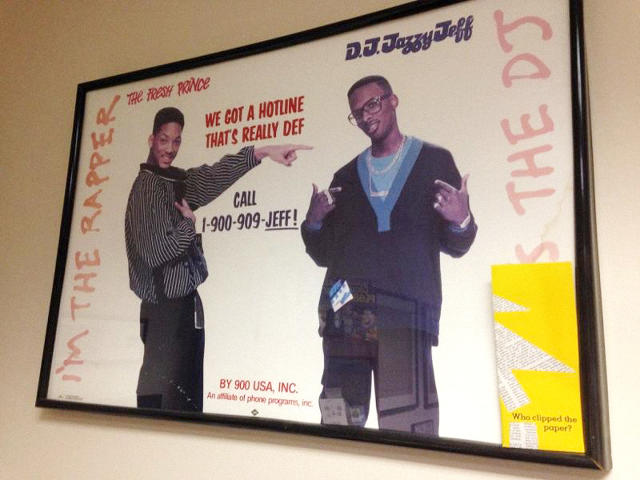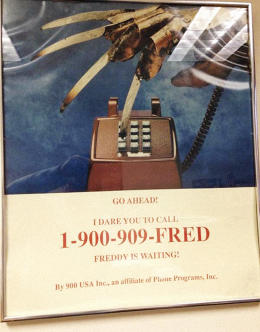As America cruised into the 1990s, phones were no longer just for calling friends and family. Startups were harnessing new technology to turn them into tools for checking sports scores and playing fantasy football, listening to music, and connecting with their favorite celebrities. Pay-by-the-minute hotline numbers were on their way to becoming a billion-dollar industry—and giving millions of people their first taste of information and entertainment on demand.
"You could call a 900 number and enter an area code and get weather or flight information," says Rick Parkhill, who founded the industry publication InfoText in 1988. "When you think about it, in the late '80s, there was no way to find out what the weather was in California if you were in New York, unless you called somebody, or turned the television on and waited for something to happen."
And to a remarkable degree, the early-'90s offerings from 900 numbers, which were funded by per-minute charges automatically added to callers' phone bills, anticipated the services that would later be delivered through the Internet. Before FanDuel and Yahoo Sports, there was phone-tree fantasy football from Pigskin Playoff. Long before there was Yik Yak, there were party lines offering pay-by-the-minute anonymous, and frequently raunchy, voice chat. And nearly two decades before there was Twitter, there were hotlines offering daily recorded updates from pop culture icons of the day, from Hulk Hogan to Will Smith and Warrant to Vanilla Ice.
"This was so wild to people—that you could pick up the phone and hear a star like Will Smith on the phone, telling you things that were going on in his life," says Cory Eisner, who was the vice president of sales and marketing at Phone Programs Inc., which operated celebrity and other hotlines.
The company's hotline featuring Smith—then known as the Fresh Prince—and DJ Jazzy Jeff is said to have brought in more than 2.5 million calls from fans looking to hear the duo's updates describing parties they'd attended and life on tour.

"Will and Jeff were traveling, of course, touring around, so we had a producer that worked with us, an audio producer, he would travel to wherever they might be," says Eisner. Other celebrities promoting music, movies, and TV shows would visit Phone Programs' New York office to record material for their 900 numbers, or phone in messages from the road.
"We would actually have some artists and celebrities who would call and we would record them, almost like how you would record your home answering system," says Eisner. "It had to be timely—it had to be, 'Wow, I just heard from him today, and I just saw him on Good Morning America.'"
Music lovers could stream new music over the phone, thanks to services offered through industry magazines like Spin and Vibe. That let readers hear music reviewed in the magazines, which could be a challenge if they didn't live near a well-stocked record store, says Jonathan Pernick, who was business development and marketing director at Spin in 1990.
"They could read the words and these descriptions from the writer, but they didn't have the ability to go out and listen to it," says Pernick, who now teaches at Florida International University. But once the hotline launched, they could hear selections from each reviewed album at the touch of a button.
"Each album would have, let's say, a certain code, and then a person was able to go in and type in the code," he says. "Press 1 for De La Soul."
At the time, the magazine used a 900-number provider in New York's northern suburbs, and Pernick would drive copies of the CDs reviewed in the magazine upstate from Spin's Manhattan offices so they could be ripped and streamed. As he recalls, the magazine and the 900-number operator split the proceeds from the service—and back then, the record labels were willing to let their music be streamed for free.
"From what I remember, the record labels loved it," he says. "I don't remember [that] we were going through any type of licensing at the time."
A few years later, Spin worked with Music Access, a company started with the explicit goal of making obscure music more accessible through telephone streaming, according to its founder, Bar Lockwood.
"It was really my way to promote music that I didn't think was ever going to get a way in the United States to be heard," says Lockwood, who previously worked for the nonprofit World Music Institute.
While the 900-number industry exploded in volume in the late '80s and early '90s—The Washington Post reported at the time that the number of such hotlines rose 83%, to 2,950, in the first half of 1990 alone—premium calling services actually date back at least to the 1970s, says Eisner. Back then, the services were locally run by the regional arms of the phone company, in conjunction with providers like Phone Programs. The company worked with New York Telephone to run a pay-per-call Dial-a-Joke service, featuring daily quips recorded by comedians like Henny Youngman and Phyllis Diller.
"The phone company would promote it as kind of have a break in your day, a little comedic relief," says Eisner. "It would almost be like old-time radio. We would produce these messages in our studio, and it would go for a minute or so depending on which line you were doing."
National prepaid numbers, using 900 as a kind of virtual area code to let them be dialed from anywhere in the U.S., got their first major test in 1980, during a presidential debate between Jimmy Carter and Ronald Reagan. ABC and AT&T operated a call-in poll, letting viewers dial one number if they thought Carter was winning the debate, and another if they thought Reagan was doing better.
Having two numbers was necessary at the time, since many viewers at the time would still have been using rotary phones. Until touch-tone phones became prominent a few years later, modern phone menus—as in, press 1 for Carter, press 2 for Reagan—just didn't exist, says Parkhill.
"There was a real revolution in the information business that began in the mid-'80s with touch-tone telephones," he says. "It seems so rudimentary today, but when you think about the world that we lived in, and people with rotary telephones, you couldn't access your bank account information."
Around the same time, as part of the breakup of the AT&T telephone monopoly, the telephone giant and its regional former affiliates were required to stop directly offering pay-per-call "information systems," creating an opportunity for new companies to enter the business. By 1991, New York magazine reported the 900-number business was pulling in $975 million per year, and Parkhill's InfoText magazine was hosting an annual industry convention where innovators were honored with Golden Phone awards.
While many Golden Phones went to big-name brands—1991 award recipients included Dow Jones's JournalPhone on-demand stock quote system and a Phone Jeopardy game with questions recorded by Alex Trebek—startups were also pouring into the 900-number field.
Character actor D.C. Douglas, who has since appeared in TV shows like NCIS and The Bold and the Beautiful, worked for a 900 number called The Party Tracker in 1993, doing everything from recording goofy TV commercials to visiting nightclubs listed on the service, which reviewed and listed events at venues around Los Angeles.
"I found an answering hardware/software IVR package that had a GUI—perfect for a Mac person," he wrote in an email to Fast Company. "I recorded and edited the reviews along with my girlfriend at the time."
And Lockwood, who now works in computer security, says she started the Music Access streaming service out of her Brooklyn apartment, where she installed hefty phone-switching equipment and a T1 phone line, and lived for a time on a struggling founder's budget.
"I literally starved for this," she says. "I remember one weekend on Friday night, I had in front of me a single scone—a scone, like you would have on Sunday morning—and that had to last me until Monday morning, when I would get the check from Spin."
Guides for entrepreneurs looking to make money in the 900-number industry even appeared on bookstore shelves—Douglas says literature he and The Party Tracker team consulted was accurate as to revenue estimates. The only problem was he and his colleagues accidentally used predictions intended for national services for what was strictly a local business, so they were never able to turn a profit.

And established players like Phone Programs learned to tell quickly if new hotlines were a hit, says Eisner.
""It was pretty much instant," he says. "If you came with an idea, and you marketed it, you could find out within a day or two if you had a winner, because you're judging it on the number of phone calls that were coming in."
By the mid-'90s, the industry had come to develop a seedy reputation, thanks to a proliferation of sexually oriented services. Pay-per-minute phone sex lines were arguably the first convenient, on-demand pornographic service, something that was then shocking to much of the public, says Eisner.
"That type of entertainment was generally focused on either those cheap little movie theaters or people selling video tapes on the black market or from somebody's trunk, so when this happened, it sort of became national news, and the media jumped on it," he says.
The industry had no good way to prevent underage callers from calling adult hotlines, or from calling any other 900 numbers without their parents' permission. News reports and regulatory hearings—and even a Simpsons plotline—began to focus on kids calling sex lines or running up massive phone bills listening to updates from their favorite celebrities.
By 1991, the Federal Communications Commission began to regulate the industry, ultimately requiring that customers be able to block 900 services from their phones and forbidding phone companies from disconnecting phones when customers refused to pay for premium services charged to their accounts. The ensuing controversy scared celebrities and big brands away from the industry, says Eisner.
"The outrage started, and it fueled an entire backlash, and it was always associated with those three digits," he says. "'900' became equated with sex, and it destroyed an industry."
At the same time, online services like CompuServe, AOL and the Web itself were beginning to provide alternative ways to get information and entertainment on demand. Online interfaces and content would soon surpass anything that was available through a phone tree, with services like Spin's over-the-phone music streaming going from cutting edge to obsolete in just a few years.
"For today's standards, it was horrible, but to be able to do that in 1990, it was amazing," says Pernick.